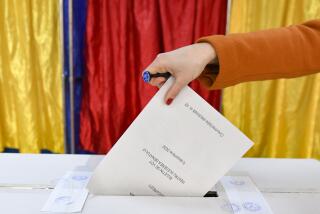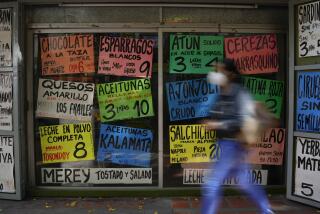Iraqis Hopeful About the Future, Poll by U.S. Group Finds
- Share via
WASHINGTON — A wide majority of Iraqi citizens are optimistic about the future of their country, according to a survey of public attitudes by the International Republican Institute that is scheduled for release today.
The survey shows that two-thirds of Iraqis questioned in mid-April said they thought their country was headed in the right direction. The figure was higher than in any of the seven previous surveys conducted in Iraq in the last year by the Washington-based institute, which has links to the Republican Party.
The strongest shift toward optimism was recorded among Sunni Muslims, the minority group that enjoyed decades of privilege in Iraq before the U.S.-led invasion in 2003. Sunnis make up a large part of the insurgency against the government and U.S.-led forces, and Sunni leaders urged a boycott of the Jan. 30 national election.
In mid-January, just over 10% of polled Sunnis said they believed the country was going in the right direction, but that number rose to more than 40% last month.
The number of all Iraqis who approved of the nation’s current direction rose nearly 15 percentage points compared with mid-January.
The International Republican Institute is one of the few Western groups that have conducted polling in Iraq, and it is the only one that has surveyed attitudes there repeatedly over the last year.
The institute describes itself as nonpartisan and nonprofit. Its board includes prominent U.S. Republicans, among them its chairman, Sen. John McCain of Arizona, and Sen. Chuck Hagel of Nebraska. The institute predicted a high turnout in Iraq’s January election, and its polls are widely followed among those who track foreign affairs.
The latest survey was conducted shortly after Shiite Muslim politician Ibrahim Jafari was selected as prime minister but while leaders of Iraq’s political parties were still sparring over the allocation of Cabinet posts. Amid the paralysis, anti-government insurgents stepped up bombings and assassinations after a postelection lull.
Polling was conducted by a local Iraqi team trained in Western polling techniques, the institute said.
The 2,705 respondents were not told the survey was being conducted on behalf of an American organization, it said. The survey, its sponsors say, has a margin of error of plus or minus 2.75 points.
The results show postelection support for the balloting process, with more than 90% of respondents saying they planned to vote in a referendum on a new constitution, which is to be drafted in the coming months. Nearly three-quarters of those questioned said they believed that if Iraq adopted a presidential form of government, the president should be directly elected by the people, rather than indirectly through the National Assembly or appointed by religious or community leaders.
“I think the results reflect the fact that life’s tough now, but there’s a lot of hope for the future,” said Judy Van Rest, executive vice president of the institute, which describes its aim as supporting the growth of political and economic freedom around the world. “It’s a continuing indication that Iraqis want to stay involved and participate in decisions that are going to affect them.”
The survey found that the two guarantees Iraqis most wanted enshrined in the new constitution were protection of basic human rights and the ability to protest government decisions.
Those rights were listed ahead of state support for religious institutions, the freedom to form civic groups, freedom of the press and mandatory religious education.
More to Read
Sign up for Essential California
The most important California stories and recommendations in your inbox every morning.
You may occasionally receive promotional content from the Los Angeles Times.










